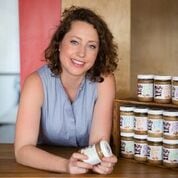The food sector is a vibrant and innovative space that attracts passionate entrepreneurs who want to build successful brands.
Recent years have seen food start-ups take a bite out of the food market – causing large-scale multinationals to sit up and take note.
While there are some prominent success stories, smaller food businesses will invariably have to overcome numerous challenges. These will be met to varying effect.
According to a survey from food founders’ festival Bread & Jam, product development is a relative doddle compared to what follows.
Bread & Jam asked 150 emerging food and drink business what their three biggest pain points are. Funding and cash-flow came top of the list, with 44% and 39% of respondents stating that they have struggled with these issues. This was followed by the thorny topic of securing distribution, which 35% of businesses identified as a challenge.
Here, three leading food sector entrepreneurs share their recipes for start-up success.
Pippa Murray, founder, Pip & Nut

Pip & Nut was founded by Murray after she started making her own nut butters as fuel when she was out running. The nut butters are free from refined sugars and palm oil and packed with the natural nutrients found in nuts. From a stall in Maltby Street Market in London, Pip & Nut products have made their way into UK retailers including Sainsbury’s, Ocado, Whole Foods Market and Holland and Barrett.
Look for a genuine gap in the market
“Finding a gap in the market can seem pretty … Although it's great if you can champion a brand new category, like what Vita Coco did for coconut water, it's not absolutely essential and it can in fact be much easier (and cheaper) to launch into an existing category that is in need of reinvigoration. Finding that gap is important though as without it you'll be fighting existing brands who will no doubt have bigger marketing pockets and already have a loyal customer base.
“When I came up with the idea for Pip & Nut … the gap I saw was that most products on the shelf at the time had palm oil or sugar inside and all of them appealed to an older demographic. I felt that you could strip those ingredients out whilst also bringing more unusual flavours in, like our coconut almond butter, and create a brand that targeted a different, younger demographic to that of the incumbent brands.”
Design matters but the product matters more
“If you create a great brand from day one then you are less likely have to spend lots of cash reworking the brand once in the market and as a small brand with a small marketing budget the more you can do to ensure your brand properly stands out on shelf the better.
“Design is important for getting that initial trial in store but what will ultimately make you successful is ensuring that the product inside tastes amazing. Repeat purchase is essential and the only way you get it is if you have spent time developing the product, testing it on your consumer and making it better than your competitors.”
Develop the right model
“One of the biggest shocks I had when creating the brand was just how tight margins were … In order to grow a sustainable FMCG business, it's important to make sure your product is at the right retail price and that everyone down the line gets the right margin, including your brand.
“This means making sure you are working with the right suppliers who can offer you a competitive price and that you've really incorporated all the costs associated with getting your product to all your customers. If you are finding that your product is significantly more expensive than your competitors on shelf, once you've incorporated everyone’s margins, then you'll need to review your product recipe and supply chain to ensure you hit the correct price point before you launch.”
Dan Germain, head of brand, Innocent Drinks

German has worked at smoothie maker Innocent since it was founded in 1999. He has seen the business progress from selling 24 smoothies on day one to over 2m a week. In 2013, the group was acquired by drinks giant Coca Cola Co and Germain stayed to continue to oversee Innocent’s branding.
Know the need
“The only way to make a successful food or drink product is to understand what people really need. What are people missing in their lives? How are they living those lives? Is your product going to find a genuine use in their day? If you don’t know those answers, then you’re just going to have an expensive hobby.”
Never accept no
“Even if you have a great idea, there are plenty of people around to tell you how it won’t work, how it can’t be made, how it’s almost good (but not good enough). If you listen to all of those people, you will never get started.”
Enjoy the tough times
“There will be days where nothing works, where the product doesn’t sell, where the world is against you. That’s normal, even inevitable. Be ready, and welcome them with open arms. You learn twice as much on those days.”
Bonnie Chung, founder Miso Tasty

Miso Tasty was founded by Chung to “bridge the gap” between eating in a Japanese restaurant and home cooking. It all started with miso but as the brand has become more established the product ranges are expanding to include other Japanese snacks and meals too. Miso Tasty’s products are now stocked in Sainsbury’s and Waitrose.
Difference is key
“Make sure your product has clear USPs and there is evidence of growing demand. I often see businesses ideas that are either one or the other, and not both. Make sure your product has clear benefits against market competitors and it is also something that the buyers are looking for. [Provide] an indication that there is a growing demand for it.”
Don’t neglect the ‘boring bits’
“Make sure your supply chain is robust by building strong reliable and flexible relationships. It's the unsexy part of the business, but it's where the show stops when it goes wrong.
“Spend time building relationships with your suppliers and buyers. Inevitably, things go wrong in supply chain and you will need these relationships to see you through.”
Team is everything
“Build a team of the right people with the right attitude. In the early days, we can't always afford the people with the most relevance experience. But we can find the best people with the right attitude who believe in what the company does and will work hard and carry a positive mind-set.
“In time, as the business grows, you will be able to afford people with relevant experience too, but that all still falls short if they don't have an attitude to match.”
Murray, Germain and Chung will be joining other food sector trailblazers to swap stories and share their experiences at the Bread & Jam food founders event in London next week (6-7 October). FoodNavigator will be bringing you coverage from the event.
